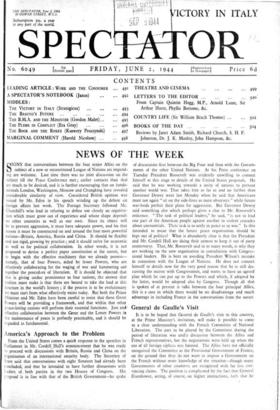America's Approach to the Problem
From the United States comes a quick response to the speeches in Parliament in Mr. Cordell Hull's announcement that he was ready to proceed with discussions with Britain, Russia and China on the organisation of an international security body. The Secretary of State said that conversations with eight Senators had already been concluded, and that he intended to have further discussions with leaders of both parties in the two Houses of Congress. His f roposal is in line with that of the British Government—he spoke
of discussions first between the Big Four and then with the Govern- ments of the other United Nations. At his Press conference on Tuesday President Roosevelt was evidently unwilling to commit himself at this stage to details of the United States proposals. He said that he was working towards a unity of nations to prevent another world war. That takes him as far as and no farther than Governor Dewey went last Monday when he said that Americans must not again " sit on the side-lines as mere observers " while future war-lords perfect their plans for aggression. But Governor Dewey said something else which perhaps gives a clue to Mr. Roosevelt's reticence. " The task of political leaders," he said, " is not to lead one part of the American people against another in violent crusades about unessentials. Their task is to unify in peace as in war." Is this intended to mean that the future peace organisation should be kept out of politics? What is abundantly clear is that the President and Mr. Cordell Hull arc doing their utmost to keep it out of party controversy. That, Mr. Roosevelt said in so many words, is why they are working on the new organisation in consultation with Congres- sional leaders. He is bent on avoiding President Wilson's mistake in connexion with the League of Nations. He does not commit himself to details now for the very good reason that he is still dis- cussing the matter with Congressmen, and wants to have an agreed plan which he can put up to the Powers and which, if adopted by the latter, would be adopted also by Congress. Though all that is spoken of at present is talks between the four principal Allies, this is a case in which there would be no disadvantage and much advantage in including France in the conversations from the outset


























